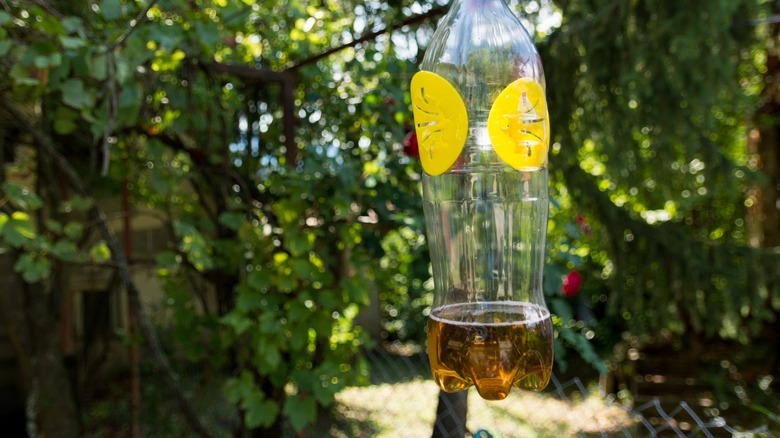Garden Trees, Shrubs & Vines
Peg Aloi
Wasps are a major annoyance, as they like to sting — but not just once. Unlike honeybees and bumblebees, wasps can sting repeatedly in a short period of time, making them especially dangerous to anyone who’s allergic. Finding an effective wasp deterrent is worthwhile, and a non-toxic solution like vinegar is often preferred by many homeowners, especially when compared to the alternative of harsh chemical pesticides.
But while the smell of vinegar is indeed unpleasant to wasps, spraying it directly onto the wasps or their nests is definitely not a good idea, as this can anger the wasps and cause them to attack you. According to experts, the best way to use vinegar is to make a trap. Setting a trap to lure wasps allows you to kill them more safely and easily than spraying. Ordinary apple cider vinegar is an effective, non-toxic way to make a simple wasp trap.
How to make a wasp trap with vinegar

Emmily/Shutterstock
Apple cider vinegar has a much fruitier smell than white vinegar, and this sour-fruit smell is what makes it attractive to wasps. To make an effective wasp trap, you’ll need an empty narrow-necked bottle. Pour some apple cider vinegar into the bottle and mix with a little bit of sugar, then add a few drops of dish soap and stir gently to avoid making soap bubbles. The soap is what catches the wasps, as it traps them in the liquid before they can figure out how to escape, effectively drowning them.
Place the trap near where you have seen wasps, either indoors or outdoors (if outdoors, put the trap under shelter to protect it from rainfall). This formula will also attract and kill gnats and fruit flies. Empty the trap every three to four days, and refill it with fresh ingredients. Soon enough, you’ll have far fewer wasps around.
Other ways to keep wasps away with vinegar
Stefan_Sutka/Shutterstock
Once you have lured, trapped, and killed wasps, it’s time to prevent them from building any more nests on your property. Wasps like to build nests underneath overhangs, above doors, inside attics, and in dense shrubs and trees. You can prevent them from making a home out of your house by thinking ahead.
In the early spring, spray a mix of equal parts water and white vinegar directly onto those potential nesting sites in order to deter them from doing so later on. Be sure there are no nests nearby, and avoid spraying if you see any wasps in the vicinity, as white vinegar angers — but does not kill — wasps. Instead, the idea is to prevent them from lingering and building a nest later on, as the acrid smell of white vinegar will help keep them away.
There are other non-toxic wasp deterrents with smells that wasps dislike and will avoid, such as peppermint oil, which you can also make a spray out of. It’s also important to keep your trash cans tightly sealed as wasps are often attracted to food scraps, especially fermenting fruits or sugar products.